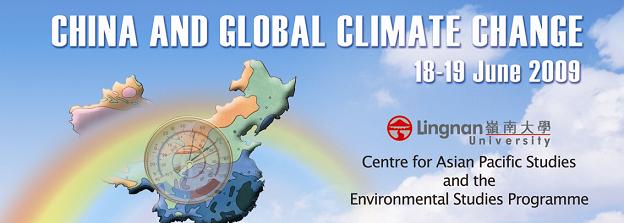
Event Title
Conference on China and Global Climate Change : Reconciling International Fairness and Protection of the Atmospheric Commons
Location
AM308, Lingnan University
Start Date
18-6-2009 11:00 AM
End Date
18-6-2009 12:30 PM
Language
English
Description
The problem of global climate change cannot be resolved without the cooperation of both China and the USA. However, neither government appears close to signing up to mandatory emissions reductions. Both nations defend their climate policies by appealing to ideas of fairness, equity and justice. This paper outlines the arguments offered by Chinese opponents of mandatory emissions reductions, highlighting three central claims about historical responsibility, ability to pay and the right to development. The first part of the paper examines these claims, the arguments supporting them, the relationships among them and their implications for a just global climate regime. Two different interpretations are suggested – the ‘overlapping consensus’ account and the ‘hybrid’ account. It is argued that only the hybrid account offers a coherent ethical position. The second part of the paper critically examines the hybrid account of global climate justice. On this account, the historical responsibility claim appears central to the Chinese argument that the West should pay the costs of tackling climate change. Several arguments against the historical responsibility claim are considered and detailed attention is paid to the argument from excusable ignorance, which suggests that the West should not be held responsible for those emissions generated before the risks of anthropogenic climate change were widely recognised. It is argued that many of the common replies to the argument from excusable ignorance are not convincing. However, a new (but limited) reply, which draws on the link between basic human rights and energy use, is proposed. The final part of the paper shows how the new reply requires a re-formulation of the hybrid account. The paper concludes by considering the implications of this new account for a just global climate regime and, in particular, China’s duties to
Document Type
Discussion
Recommended Citation
Bell, D. (2009). Climate duties, human rights and historic emissions. In China and global climate change: Proceedings of the conference held at Lingnan University, Hong Kong, 18-19 June 2009 (pp. 128-142). Centre for Asian Pacific Studies and the Environmental Studies Programme, Lingnan University, Hong Kong.
Included in
Climate duties, human rights and historic emissions
AM308, Lingnan University
The problem of global climate change cannot be resolved without the cooperation of both China and the USA. However, neither government appears close to signing up to mandatory emissions reductions. Both nations defend their climate policies by appealing to ideas of fairness, equity and justice. This paper outlines the arguments offered by Chinese opponents of mandatory emissions reductions, highlighting three central claims about historical responsibility, ability to pay and the right to development. The first part of the paper examines these claims, the arguments supporting them, the relationships among them and their implications for a just global climate regime. Two different interpretations are suggested – the ‘overlapping consensus’ account and the ‘hybrid’ account. It is argued that only the hybrid account offers a coherent ethical position. The second part of the paper critically examines the hybrid account of global climate justice. On this account, the historical responsibility claim appears central to the Chinese argument that the West should pay the costs of tackling climate change. Several arguments against the historical responsibility claim are considered and detailed attention is paid to the argument from excusable ignorance, which suggests that the West should not be held responsible for those emissions generated before the risks of anthropogenic climate change were widely recognised. It is argued that many of the common replies to the argument from excusable ignorance are not convincing. However, a new (but limited) reply, which draws on the link between basic human rights and energy use, is proposed. The final part of the paper shows how the new reply requires a re-formulation of the hybrid account. The paper concludes by considering the implications of this new account for a just global climate regime and, in particular, China’s duties to

